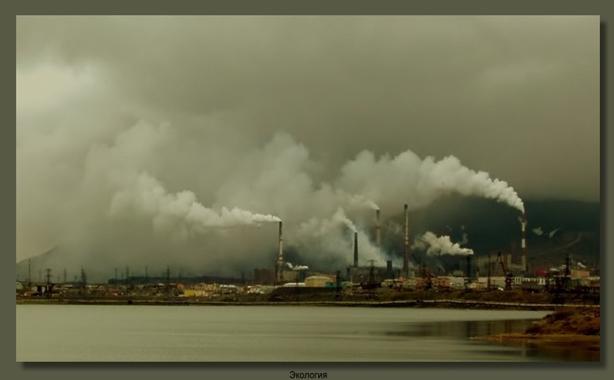UNIT3. ENVIRONMENTAL PROBLEMS IN RUSSIA
TEXT1. RUSSIAN ENVIRONMENT IN THE 21st CENTURY
Nobody doubts that in the 21st century Russia will experience a grave ecological crisis. According to experts ecologically dangerous regions account for over 17 percent of the former USSR's territory. Russian cities register an increase in the concentration of air pollutants. One hundred percent of the surveyed cities registers an increase in phenol, carbon bisulphate, ammonia; 90 percent registers an increase in nitrogen; 77–78 percent registers a rise in carbon monoxide and dust. Nineteen Russian districts with a total population of 5.5 million register an extremely high concentration of air pollutants which exceeds the PLC (permissible level of concentration) more than 50 times. Due to the polluted environment 20–50 percent of foodstuffs contain toxic chemicals, heavy metals and other pollutants which are health hazards. Sixteen percent of the surveyed territories are contaminated by the prohibited pesticide DDT which in some cases exceeds the PLC 190 times. In other words Russia entered a new millennium burdened with the inertia of a stagnant crisis.

In 2001 a large group of scientists tailored a program of ecological security in Russia and estimated the damage caused by the degradation of the environment.
Among the root-causes of the protracted crisis are the following:
- the lack of clear cut priorities in social development;
- unrealized significance of ecological problems (these problems do not concern only Russia, they are common to all mankind).
Still the crisis of decline may turn into a crisis of growth. First things are not that bad. The economic activity has not damaged many Russian territories and they still have pure rivers and plenty of fish and game. We have a good system of natural reserves and state-protected territories inherited from the former USSR. Now we possess sufficient information on the real state of the environment. The society is beginning to realize the need for environmental conservation. To accomplish this task the Ministry of Environmental Protection has been set up. Finally, luckily for Russia, it has highly experienced specialists in ecology.
To redirect the country's ecological development it is necessary to start with obvious, though difficult, steps:
- to speedily devise legal and economic mechanisms regulating the use of natural resources and the impact on the environment;
- to restructure the economy, introduce new technologies, update ecological education and promote science.
At a rough estimate within 25–30 years we can improve Russia's ecology by 50 percent as well as drastically reduce the risk of natural calamities.
Ex.1. Answer the following questions:
- Can you describe the situation in ecologically dangerous regions?
- What are the root-causes of the present crisis?
- What are factors of hope, concerning our environment?
- What steps should be taken to improve the ecological situation?
Ex.2. Give Russian equivalents for the following:
Gas and oil prospecting; to tailor a program of ecological security; natural reserves; to redirect the country's ecological development; the state adviser on ecology; to achieve political reconciliation.
Ex.3. Retell the text.